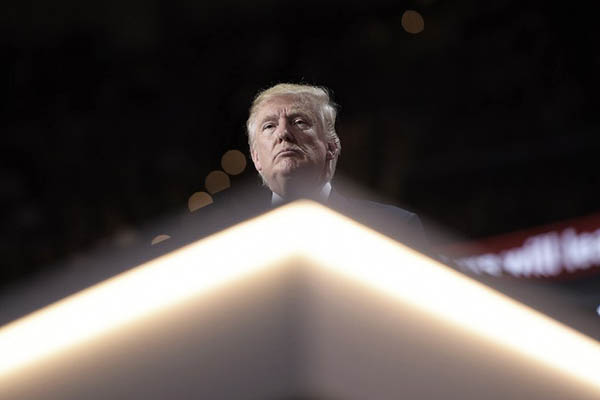
Brendan Smialowski—AFP
U.S. president urges world to unite against ‘global threat’ posed by Pyongyang
U.S. President Donald Trump said on Thursday he was considering a “pretty severe” response to North Korea’s intercontinental ballistic missile test, even as his defense secretary said the United States is still seeking a diplomatic solution to the standoff.
International divisions on how to contain the North Korean threat continued to sharpen, meanwhile, as Russia blocked a U.N. Security Council statement calling for fresh sanctions and China appealed for a scaling down of rhetoric.
Washington has led the push for tougher sanctions in response to the milestone in Pyongyang’s drive to threaten the U.S. mainland with a nuclear strike, and Trump has also warned he is ready to use force if necessary. “I call on all nations to confront this global threat and publicly demonstrate to North Korea that there are consequences for their very, very bad behavior,” Trump said during a visit to Warsaw. “I have pretty severe things that we’re thinking about,” Trump said, adding: “That doesn’t mean that we’ll do them.”
While the Pentagon has drawn up an array of plans for a possible military intervention in North Korea, Pentagon chief Jim Mattis said he did not think America was closer to conflict because of the ICBM test. “I do not believe this capability in itself brings us closer to war because the president has been very clear, and the secretary of state has been very clear, that we are leading with diplomatic and economic efforts,” Mattis said. “As [Winston] Churchill put it, better to jaw-jaw than war-war.”
The launch of the missile, which experts say could reach Alaska or even further toward the continental U.S., is set to be a key issue at the G20 summit in Germany that begins Friday with the leaders of the U.S., China and South Korea in attendance. It poses a thorny policy challenge for Trump, who is at loggerheads with Beijing over how to handle Kim Jong-Un’s regime.
Trump has repeatedly urged Pyongyang’s chief backer Beijing to rein the Stalinist state in, taking to Twitter this week to publicly berate Beijing for not squeezing the North hard enough on trade. China responded on Thursday with a call for more moderate language from all sides.
Washington had made a hard-hitting call in the U.N. Security Council on Wednesday for tougher sanctions against Pyongyang after the missile test. But Russia contested a Security Council statement on Thursday calling for “significant measures” in response, signaling that it might not back a final resolution putting fresh sanctions in place.
China’s President Xi Jinping stressed that the best way to rid the Korean Peninsula of nuclear weapons was through dialogue and negotiations, the Xinhua news agency reported. Likewise, South Korean President Moon Jae-In said his previous offer for talks with Kim was still on the table despite the missile test, warning it was “dangerous” if there was “no dialogue whatsoever.”
But Moon has also called for a response to the test beyond “just words,” prompting a joint missile drill with its ally the U.S. aimed at countering threats from the North.
Trump had dismissed the idea of North Korea having a working ICBM, vowing it “won’t happen.”
The test has sent jitters through global stock markets, with shares falling on Thursday.
Beijing insists it has made “relentless efforts” to curb Pyongyang’s nuclear ambitions in line with U.N. economic sanctions. China stopped buying North Korean coal in February and total imports from the North have steadily dropped every month from $207 million in January to $99 million in April. But official Chinese customs data shows a 37.4 percent rise in yuan terms in overall trade with North Korea and 30.6 percent in U.S. dollars in the first quarter. “Trade between China and North Korea grew almost 40%… so much for China working with us – but we had to give it a try!” Trump tweeted on Wednesday.
For China, the worst-case scenario is a collapse of the regime in Pyongyang, which could see an influx of refugees from its impoverished neighbor, and worse yet, U.S. troops stationed on its border in a united Korea.
Trump had until recently nurtured friendly ties with Xi, hosting him at his Mar-a-Lago resort in Florida in April, when they agreed on a 100-day plan to improve trade relations.
China’s foreign ministry spokesman Geng Shuang defended his country’s dealings with North Korea, insisting Beijing has upheld U.N. sanction resolutions “in a comprehensive and earnest manner.” But, he added, sanctions “should not harm the livelihood and normal humanitarian need of the DPRK,” using the initials of North Korea’s official name.
